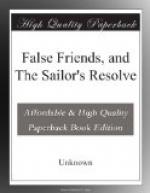Yes, Lady Grange was very miserable. And how did she endeavour to lighten the burden of her misery? Was it by counting over her jewels,—looking at the costly and beautiful things which adorned her dwelling,—thinking of her carriages and horses and glittering plate, or the number of her rich and titled friends? No; she sought comfort where Widow Green had sought it when her child lay dangerously ill, and there was neither a loaf on her shelf nor a penny in her purse. The rich lady did what the poor one had done,—she fell on her knees and with tears poured out her heart to the merciful Father of all. She told him her sorrows, she told him her fears; she asked him for that help which she so much required. Her case was a harder one than the widow’s. A visit from the clergyman, a present from a benevolent friend, God’s blessing on a simple remedy, had soon changed Mrs. Green’s sorrow into joy. The anguish of Lady Grange lay deeper; her faith was more sorely tried; her fears were not for the bodies but the souls of those whom she loved;—and where is the mortal who can give us a cure for the disease of sin?
While his mother was weeping and praying, Philip was revelling and drinking. Fast were the bottles pushed round, and often were the glasses refilled. The stately banqueting-room resounded with laughter and merriment; and as the evening advanced, with boisterous song. It was late before the young men quitted the table; and then, heated with wine, they threw the window wide open, to let the freshness of the night air cool their fevered temples.
Beautiful looked the park in the calm moonlight. Not a breath stirred the branches of the trees, their dark shadows lay motionless on the green sward: perfect silence and stillness reigned around. But the holy quietness of nature was rudely disturbed by the voices of the revellers.
With the conversation that passed I shall not soil my pages. The window opened into a broad stone balcony, and seating themselves upon its parapet, the young men exchanged stories and jests. After many sallies of so-called wit, Wildrake rallied Philip on the quantity of wine which he had taken, and betted that he could not walk steadily from the one end of the balcony to the other. Philip, with that insane pride which can plume itself on being mighty to mingle strong drink, maintained that his head was as clear and his faculties as perfect as though he had tasted nothing but water; and declared that he could walk round the edge of the parapet with as steady a step as he would tread the gravel-path in the morning!
Wildrake laughed, and dared him to do it: Jones betted ten to one that he could not.
“Done!” cried Philip, and sprang up on the parapet in a moment.
“Come down again!” called out Wildrake, who had enough of sense left to perceive the folly and danger of the wager.
Philip did not appear to hear him. Attempting to balance himself by his arms, with a slow and unsteady step he began to make his way along the lofty and narrow edge.




